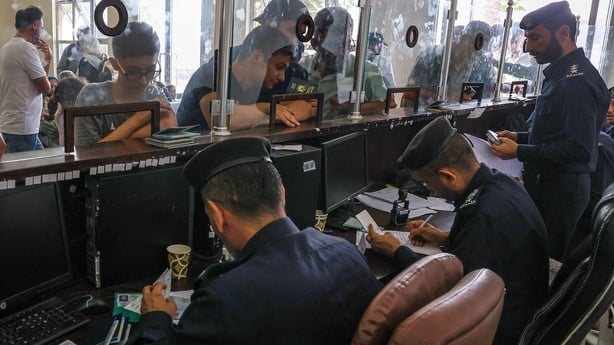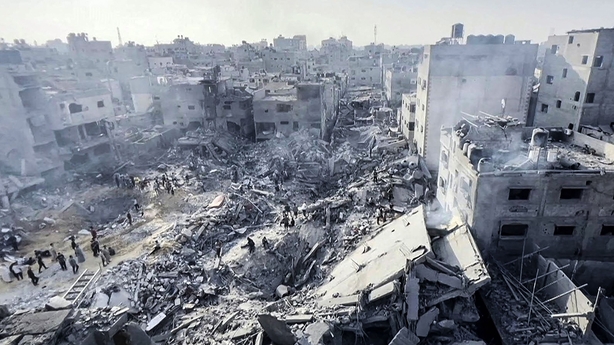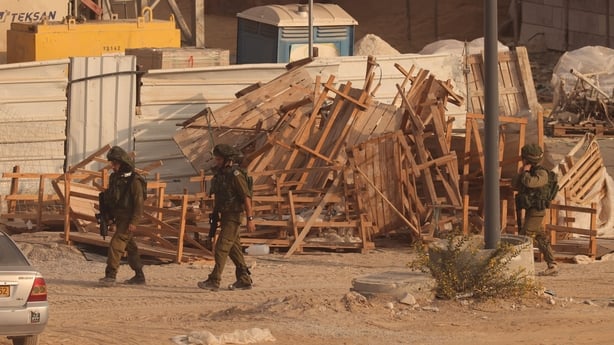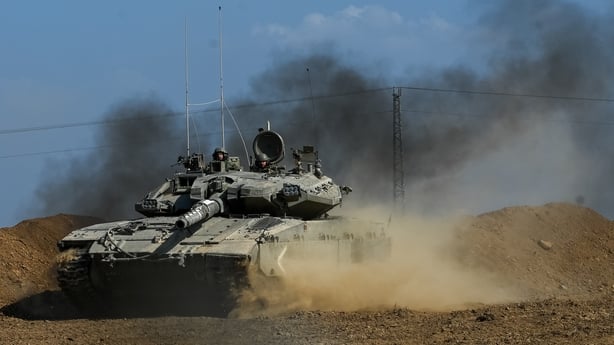Israel's military has said its forces have surrounded the Hamas stronghold of Gaza City after a day that saw the Palestinian territory pounded by deadly fire.
The Ezzedine Al-Qassam Brigades, the military wing of Hamas, warned Israel its invading soldiers would go home "in black bags".
Spokesman Abu Obeida said: "Gaza will be the curse of history for Israel."
The Hamas warning came after Israeli military spokesman Daniel Hagari said troops had completely surrounded Gaza City after days of expanding ground operations.
"Israeli soldiers have completed the encirclement of the city of Gaza, the centre of the Hamas terror organisation," Mr Hagari told journalists.
"The concept of a ceasefire is not currently on the table at all," he added.
Amid growing fears of the conflict spreading, Israel and Hezbollah fighters in Lebanon exchanged fire after a salvo of rockets slammed into a northern Israel town.
As he left on a new Middle East visit, US Secretary of State Antony Blinken said he would work to avoid escalation of the Israel-Hamas war.
"We've been very clear in some of the actions we're taking that we are determined to deter any escalation," Mr Blinken said.
Plan to evacuate 7,000 through Rafah crossing
Hundreds more foreigners and dual nationals fled war-torn Gaza for Egypt on Thursday as Israeli forces bombarded and fought ground battles in the besieged Palestinian territory, where thousands have died.
Egypt said it eventually plans to help evacuate 7,000 foreigners through the Rafah crossing and a spokesman for the Palestinian side of the border post said about 100 had been able to leave on Thursday.
A total of 400 foreign passport holders as well as 60 severely wounded Palestinians in ambulances were due to cross by the end of the second day of departures, Wael Abu Mohsen said, and Egyptian officials later reported the first arrivals.
A list of those approved to travel on Thursday shows hundreds of US citizens and 50 Belgians along with smaller numbers from various European, Arab, Asian and African countries.
"There was no food, no water, no gas, nowhere to take shelter," said US passport holder Salma Shaath, 14, as she prepared to cross. "People were going to hospitals to sleep, there are a lot of martyrs, there is no internet, no communications and no electricity.
"Our house was bombed and our situation was difficult, so we came here to Rafah, and now we're planning to travel."
The evacuation marks a tiny proportion of the 2.4 million people trapped in Gaza under weeks bombardment since Hamas launched their bloody cross-border attack into Israel on 7 October.
It is understood no Irish passport holders have left Gaza yet and none are on the list to leave today.
Minister of State Dara Calleary has encouraged anybody with connections in Gaza to register with the Department of Foreign Affairs, if they have not done so already.
"I know the Department of Foreign Affairs are working incredibly hard to get Irish passport holders out.
"They are in regular contact with each of the names that they have and again I have to reiterate, if there's anybody or anybody that has connections in Gaza that haven't registered with the Department of Foreign Affairs, please register."
Speaking on RTÉ's Morning Ireland, Mr Calleary said: "I know the Tánaiste is leading efforts to try and get Irish people out. I know they're throwing everything at it.
"It is a very complex situation. It is only today that people are beginning to get out and I think everything is being done to ensure we get our Irish passport holders out."

'Whole families killed'
The Israeli army is also seeking to free around 240 hostages, both civilians and troops, captured by Hamas during the attacks.
On Thursday, the military said it had killed dozens of enemy fighters.
"IDF fighters continue to advance in the Gaza City area and conduct face-to-face battles with Hamas terrorists and to deepen the fighting," military spokesman Daniel Hagari told journalists.
"At the end of a battle that lasted several hours and included ground fighting and fire support from aircraft and a missile ship, many terrorists were killed."
We need your consent to load this Datawrapper contentWe use Datawrapper to manage extra content that can set cookies on your device and collect data about your activity. Please review their details and accept them to load the content.Manage Preferences
Some 332 soldiers have already died in the 7 October attacks and in the Israeli offensive the Hamas assault triggered.
Now gruelling urban warfare lies ahead deeper inside Gaza, where Hamas is fighting from a tunnel network spanning hundreds of kilometres (miles).
Global concern has risen sharply over Israel's response, in which the army says it has struck more than 12,000 targets so far.

The Hamas-run Gaza health ministry says more than 9,000 people have died, mostly women and children.
Special concern has focused on repeated heavy strikes on Gaza's largest refugee camp - densely populated Jabalia, north of Gaza City - where explosions brought down residential buildings.
Gaza's Hamas-ruled government said 195 were killed in two days of Israeli strikes on Jabalia, with hundreds more missing and wounded, figures AFP could not independently verify.
Hamas said seven of the estimated 242 hostages it is holding, died in Tuesday's bombings, a claim that was also impossible to verify.
'This is not a life'
Major strikes also hit Gaza's Bureij refugee camp and an area near a UN-run school, where the health ministry said 27 had died.
Outside the Al-Quds hospital in Gaza City, displaced residents seeking shelter from Israeli strikes told AFP that civilians would not withstand the barrage much longer.
"This is not a life. We need a safe place for our kids," said 50-year-old Hiyam Shamlakh. "Everybody is terrified, children, women and the elderly."
Talal Shamlakh, 65, said: "There have been missiles since 7:00am around the hospital and we couldn't sleep while children are screaming."
Another Gazan, Mahmoud Abu Jarad, said civilians would not be able to tolerate another week of strikes. "We demand a ceasefire. This is the most important thing," the 30-year-old said.

Biden calls for 'pause' to get hostages out
US President Joe Biden has called for a "pause" in the conflict after a heckler pushing for a ceasefire confronted him at a campaign fundraiser.
Mr Biden was speaking to about 200 people when the heckler shouted: "As a rabbi, I need you to call for a ceasefire right now."
Mr Biden responded: "I think we need a pause. A pause means give time to get the prisoners out."
The White House later clarified that Mr Biden was referring to the hostages, not prisoners, held by Hamas.
The White House has previously said it supports a "humanitarian pause" to allow aid deliveries to Gaza and the release of hostages.
Mr Biden has thrown his support behind Israel, and visited the country last month, but he has shifted his response in recent weeks as the humanitarian situation worsens in Gaza and the civilian death toll rises.

'Death every day'
Israel has sought to justify the first Jabalia attack by saying it had targeted a senior Hamas commander in a tunnel complex below the camp.
AFP has witnessed rescuers desperately clawing through the rubble and twisted metal in frantic attempts to bring out survivors and bodies.
Emergency responders say "whole families" have died.
The wounded were rushed away by cart, motorcycle and ambulance as anguished wails and blaring sirens filled the dusty air.
But Gaza's hospitals have been overwhelmed and run short of medical supplies and even electricity.
Tensions and violence have also spread in the Israeli-occupied West Bank, where more than 130 Palestinians have died, according to the Palestinian health ministry.
Three Palestinians were killed on Thursday by Israeli fire in the West Bank, the ministry said, and an Israeli was killed in a Palestinian shooting attack, according to first responders.
In embattled Gaza, more than 20,000 people are wounded, according to aid group Doctors Without Borders.
Israel has argued it is trying to avoid civilian casualties and has told residents to evacuate northern Gaza. It also says Hamas has blocked many civilians from leaving to use them as "human shields".
While the United States and other Western powers have largely backed Israel, anger has flared across the Arab and Muslim world.
Jordan has recalled its ambassador to Israel "to condemn the Israeli war that is killing innocent people in Gaza".
Israel has also drawn fire from Iran-backed enemy forces, including Hezbollah in neighbouring Lebanon and Huthi rebels in distant Yemen.
The United States and several Western countries back Israel in ruling out a ceasefire for now, arguing that it must have the right to defend itself against Hamas.
More than 220 aid trucks have so far entered under a US-brokered deal, an amount aid groups say falls far short of meeting basic needs.
